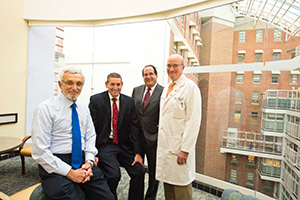 Senior financial services executive Neil Kishter is not the type to take adversity lying down. So when his wife of 20 years, Dana, passed away after bravely battling three bouts of leukemia, Mr. Kishter responded with action—committing to make a difference by enhancing the environment for cancer patients, families, and staff at the University of Maryland Marlene and Stewart Greenebaum Cancer Center (UMGCC).
Senior financial services executive Neil Kishter is not the type to take adversity lying down. So when his wife of 20 years, Dana, passed away after bravely battling three bouts of leukemia, Mr. Kishter responded with action—committing to make a difference by enhancing the environment for cancer patients, families, and staff at the University of Maryland Marlene and Stewart Greenebaum Cancer Center (UMGCC).
Mr. Kishter had already begun to improve the cancer care experience while Dana was still in treatment, donating new TVs and DVD players for every room in the bone marrow transplant (BMT) unit where she received a transplant. Seven years ago, in recognition of the amazing care his wife received, he also started to sponsor the annual employee holiday party, a tradition he plans to continue.
“A BMT patient is in the unit for a couple of months on average, so I developed a close relationship with the faculty and staff,” says Mr. Kishter. When Dana’s doctor, Director Emeritus Saul Yanovich, MD, later related the details of larger needs, Mr. Kishter was happy to help. Since then, in collaboration with UMGCC medical director Kevin Cullen, MD and professor of medicine Aaron Rapoport, MD, he has supported the purchase of cutting-edge new treatment equipment and the construction of an expanded family area. In Dana’s memory, this dedicated area accommodates more loved ones inside the air-filtered unit, which patients cannot leave.
“In addition to serving as both a donor and board member at the Marlene and Stewart Greenebaum Cancer Center, I’ve been involved with other cancer organizations, which include the American Cancer Society and Leukemia and Lymphoma Society,” notes Mr. Kishter. “I’ve found the things that can really touch patients and staff are often not budget items.”
Going forward, Mr. Kishter with the support of his second wife, Emily, plans to keep making contributions that give cancer patients, families, and caregivers as much peace as possible. “I’m actively engaged and do whatever I can to make it easier,” Mr. Kishter says. “I can’t change the prognosis, but I can try to make the experience less painful and hope that a larger waiting room, better equipment, and other enhancements make a difference.”